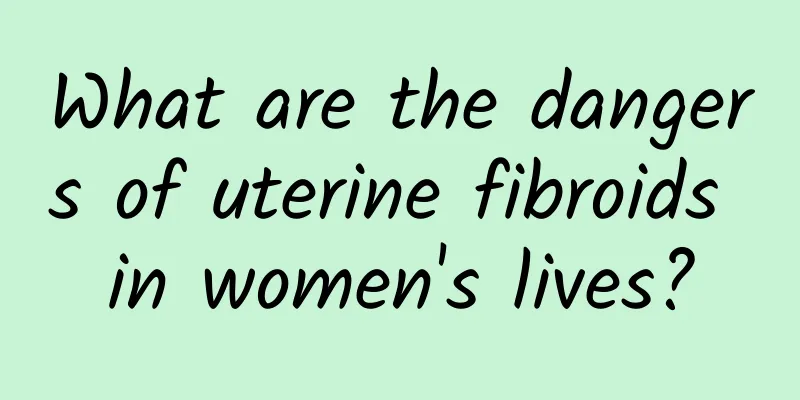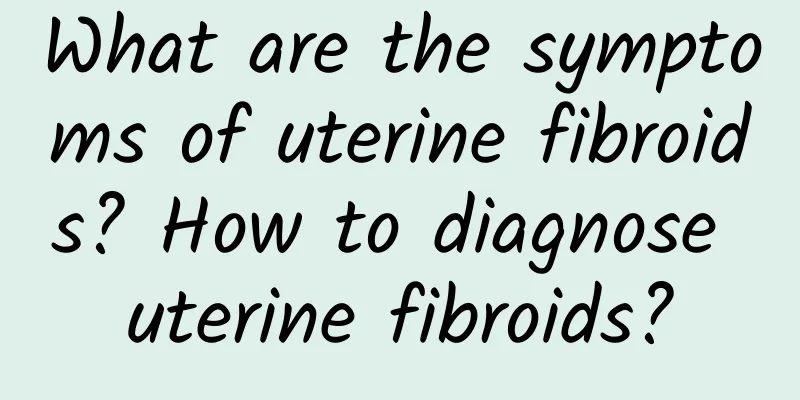Is bleeding a symptom of uterine fibroids? What medicine should I take? Is uterine bleeding a symptom of uterine fibroids?

|
Uterine fibroids are a common benign tumor in gynecology, mostly seen in women of childbearing age. Uterine fibroids are mainly formed by the proliferation of smooth muscle cells in the uterine muscles, and generally do not cause obvious symptoms. However, sometimes uterine fibroids can cause uterine bleeding, which raises some people's questions: Is bleeding caused by uterine fibroids? What medicine do I need to take to treat uterine bleeding? Let's take a closer look. We must make it clear that uterine bleeding does not necessarily mean that you have uterine fibroids. Uterine bleeding is a common gynecological symptom and may be caused by a variety of reasons, including endocrine disorders, reproductive system infections, cervical lesions, endometriosis, etc. Therefore, it is unscientific to identify uterine fibroids based solely on uterine bleeding. If you have uterine bleeding, it is recommended to seek medical attention in a timely manner and receive a comprehensive examination and evaluation from a doctor. So, if uterine bleeding is caused by uterine fibroids, how should it be treated? The first thing to be clear is that if uterine fibroids do not cause obvious symptoms or affect the quality of life, special drug treatment is generally not required. The doctor will develop a corresponding treatment plan based on the patient's specific situation. If uterine fibroids cause more severe bleeding, surgical treatment may be required, such as removal of the uterine fibroids or hysterectomy. For some special cases, such as women preparing for pregnancy or wishing to keep their uterus, doctors may consider giving drug treatment, such as luteinizing hormone-releasing hormone drugs. Let's introduce some relevant knowledge about uterine fibroids. Uterine fibroids are a common benign gynecological tumor, which is more common in women aged 20-50. Its occurrence is related to many factors, including genetic factors, changes in hormone levels, etc. Most uterine fibroids are small, asymptomatic, and do not require special treatment. However, for some larger fibroids that occur in the adenomyosis of the uterus, or fibroids that cause obvious symptoms such as pain, bleeding, etc., surgical treatment or drug treatment may be required. Bleeding is not necessarily caused by uterine fibroids. If uterine bleeding occurs, it is recommended to seek medical attention in time. The doctor will evaluate the specific situation and formulate a corresponding treatment plan to protect the patient's health. In order to prevent the occurrence of uterine fibroids, female friends should also pay attention to maintaining good living habits, avoid excessive fatigue, keep emotional stability, and have regular physical examinations. |
<<: What causes uterine adenomyosis to grow? Does uterine adenomyosis grow fast?
Recommend
Lose the fat! The golden period for weight loss one month after the Lantern Festival
The result of overindulgence during the Chinese N...
Common knowledge about the diet of patients with adnexitis
The diet of adnexitis has many requirements in li...
How much does chocolate cyst surgery cost?
How much does it cost to treat chocolate ovarian ...
What are the dietary taboos for menopause?
Menopause is a common phenomenon in women. Physio...
What are the main early symptoms of congenital absence of vagina?
You should know that what people call "stone...
These 4 reasons are the real culprits that cause your menstrual blood to be black!
Many female friends will say that their menstruat...
What are the symptoms of cervicitis in women? What are the care methods for women with cervicitis?
Cervicitis is a common gynecological disease for ...
What causes abdominal pain before menstruation?
Why does abdominal pain occur before menstruation...
Reverse fatty liver disease! Nutritionist: Avoid white rice and the "three whites"
One out of every 2 to 3 people in the country suf...
What are the procedures for hysterectomy? What are the preparations for hysterectomy?
What are the procedures for hysterectomy? What ar...
How to regulate irregular menstruation for women? Teach you how to properly solve the troubles of irregular menstruation
Irregular menstruation is one of the common disea...
Winter melon is high in fiber and low in calories. Can eating it properly help you lose weight? Traditional Chinese Medicine: First understand whether it is a damp-heat constitution
When it comes to winter melon, most people are fa...
Will it be the same if I get pregnant again after a missed abortion?
The risk of getting pregnant again after a missed...
What to do if uterine fibroids bleed
What should I do if my uterine fibroids bleed? Wh...
What does uterine effusion mean?
Experts point out that most patients with uterine...









